

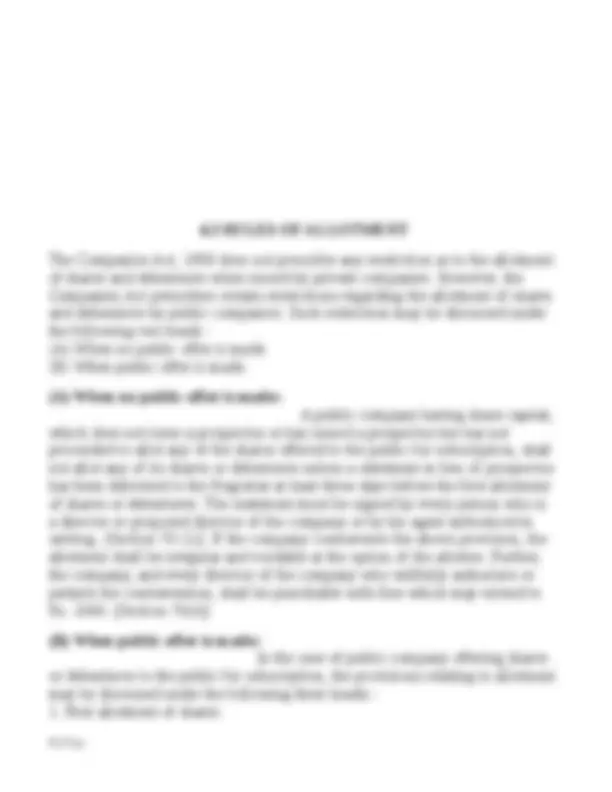
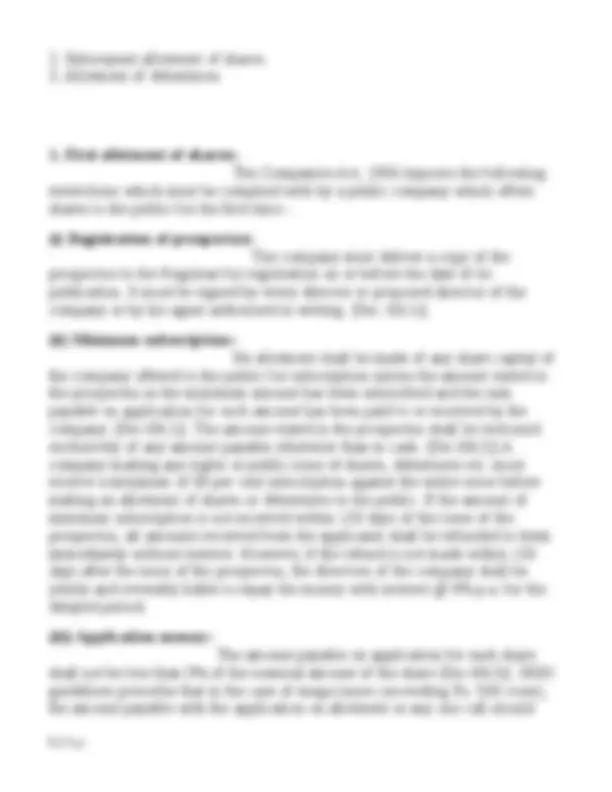
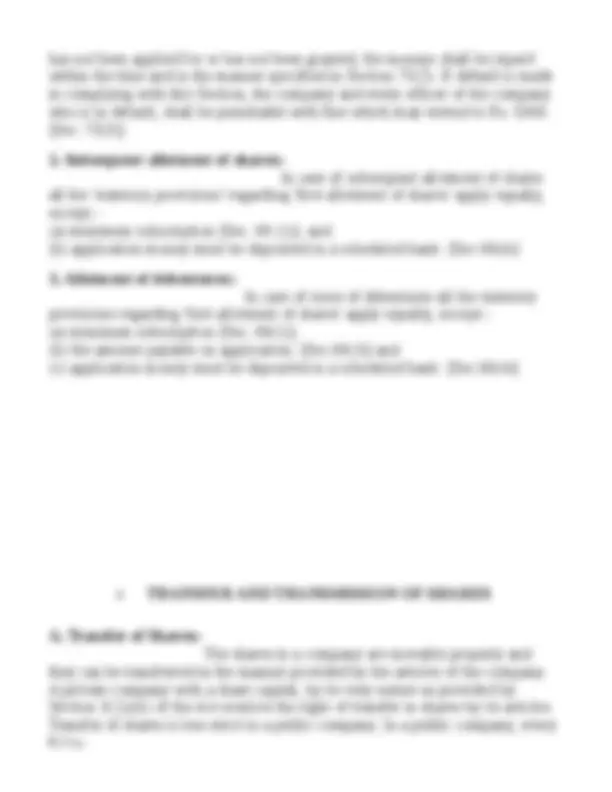
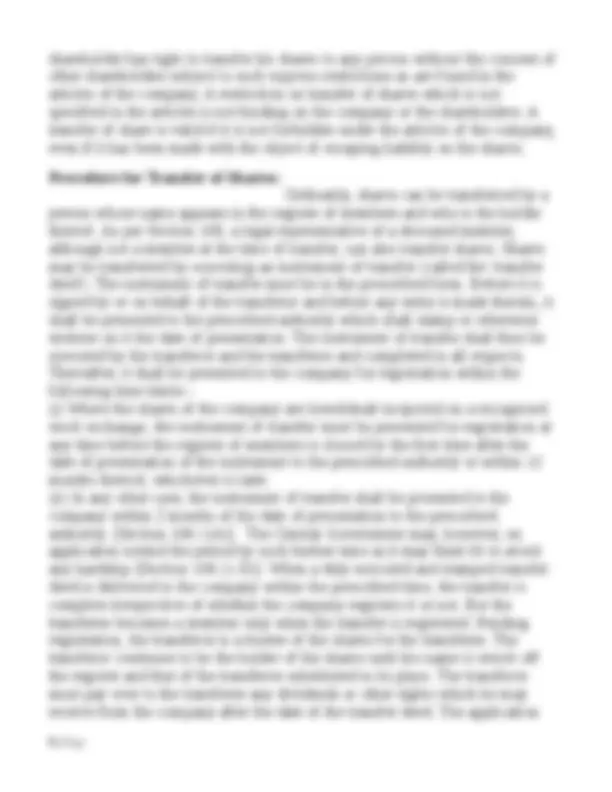
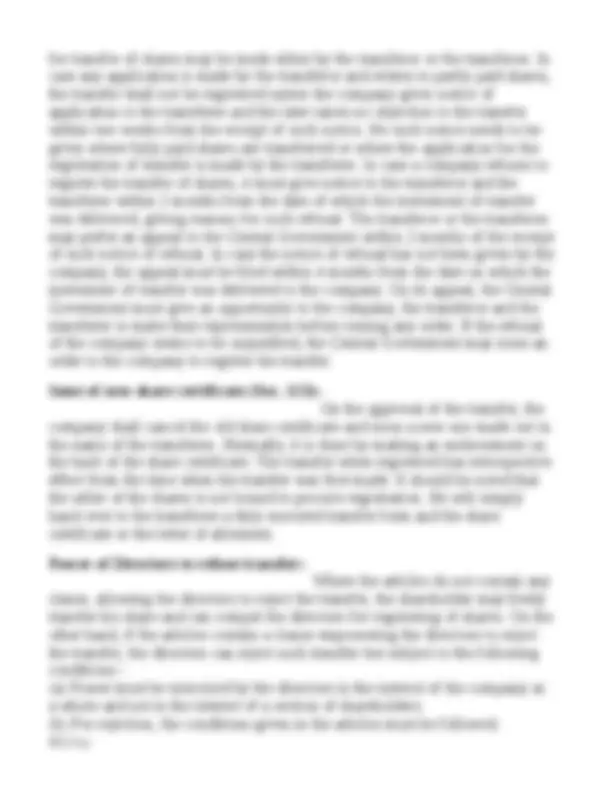
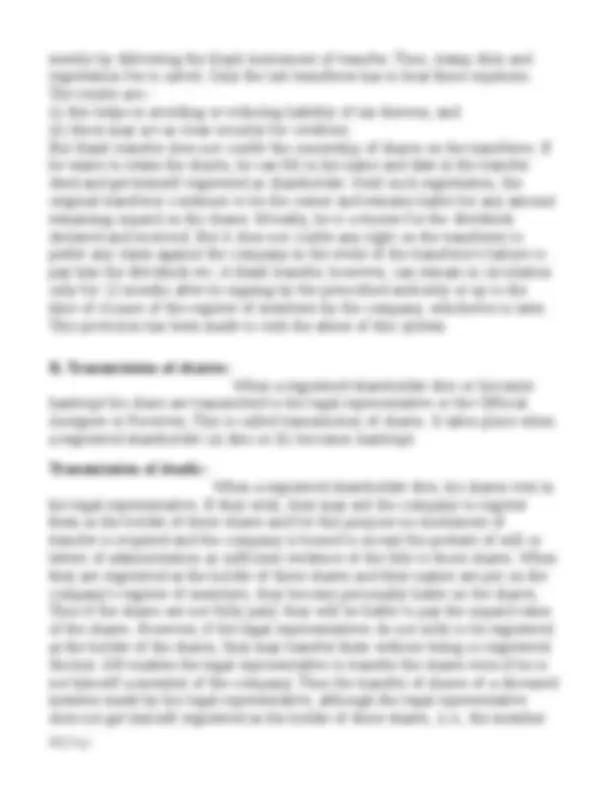

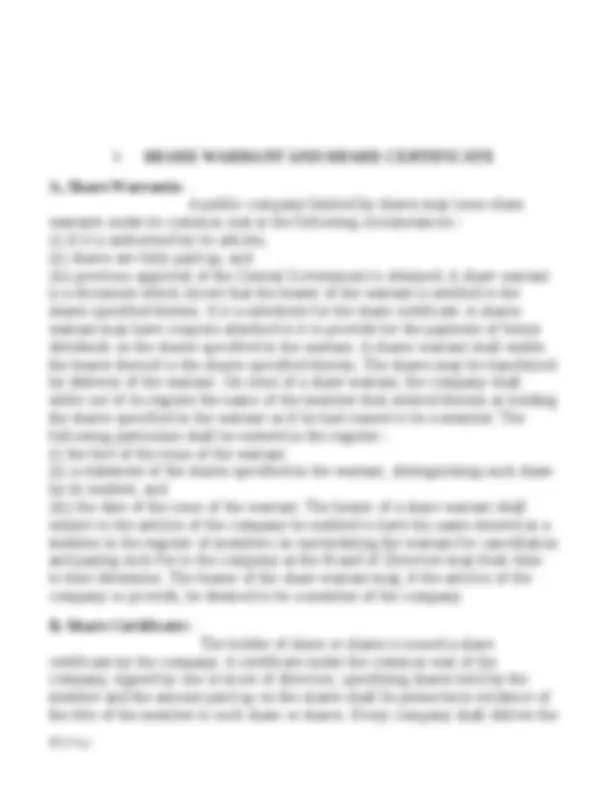




Study with the several resources on Docsity

Earn points by helping other students or get them with a premium plan


Prepare for your exams
Study with the several resources on Docsity

Earn points to download
Earn points by helping other students or get them with a premium plan
Community
Ask the community for help and clear up your study doubts
Discover the best universities in your country according to Docsity users
Free resources
Download our free guides on studying techniques, anxiety management strategies, and thesis advice from Docsity tutors
company law allotment of shares and debentures and charges
Typology: Lecture notes
1 / 19

This page cannot be seen from the preview
Don't miss anything!












After reading this lesson, you will be conversant with:-
a) General principles regarding allotment. b) Rules of allotment of shares and debentures. c) Procedure for transfer of shares and powers of directors to refuse transfer. d) Transmission of shares.
e) Procedure for issuing share warrant and share certificate.
When a company issue a prospectus inviting the public to subscribe for the shares of a company, it is merely an invitation rather than an offer. An application for shares is an offer by the prospective shareholders to take the shares of the company. Such offers are made on application forms supplied by the company. When an application is accepted, it is called allotment. Allotment is the acceptance by the company of the offer made by the applicant. Allotment results in a binding contract between the parties. The term allotment has not been defined in the Companies Act. In Sri Gopal Jalan & Co. v. Calcutta Stock Exchange Association Ltd., (1963), allotment of shares was explained by the Supreme Court as "the appropriation, out of the previously unappropriated capital of the company, of a certain number of shares to a person. It is only after allotment that shares come into existence. Reissue of forfeited shares is not an allotment'.
The provisions of the law of contract regarding the acceptance of an offer apply to the allotment of shares by a company. The general principles relating to the allotment of shares are as follows:-
The Companies Act, 1956 does not prescribe any restriction as to the allotment of shares and debentures when issued by private companies. However, the Companies Act prescribes certain restrictions regarding the allotment of shares and debentures by public companies. Such restriction may be discussed under the following two heads : (A) When no public offer is made. (B) When public offer is made.
(A) When no public offer is made:- A public company having share capital, which does not issue a prospectus or has issued a prospectus but has not proceeded to allot any of the shares offered to the public for subscription, shall not allot any of its shares or debentures unless a statement in lieu of prospectus has been delivered to the Registrar at least three days before the first allotment of shares or debentures. The statement must be signed by every person who is a director or proposed director of the company or by his agent authorized in writing. (Section 70 (1)]. If the company contravenes the above provision, the allotment shall be irregular and voidable at the option of the allottee. Further, the company, and every director of the company who willfully authorises or permits the contravention, shall be punishable with fine which may extend to Rs. 1000. [Section 70(4)]
(B) When public offer is made:- In the case of public company offering shares or debentures to the public for subscription, the provisions relating to allotment may be discussed under the following three heads:-
(i) Registration of prospectus:- The company must deliver a copy of the prospectus to the Registrar for registration on or before the date of its publication. It must be signed by every director or proposed director of the company or by his agent authorised in writing. [Sec. 60(1)].
(ii) Minimum subscription:- No allotment shall be made of any share capital of the company offered to the public for subscription unless the amount stated in the prospectus as the minimum amount has been subscribed and the sum payable on application for such amount has been paid to or received by the company. [Sec.69(1)]. The amount stated in the prospectus shall be reckoned exclusively of any amount payable otherwise than in cash. [Sec.69(2)] A company making any rights or public issue of shares, debentures etc. must receive a minimum of 90 per cent subscription against the entire issue before making an allotment of shares or debentures to the public. If the amount of minimum subscription is not received within 120 days of the issue of the prospectus, all amounts received from the applicants shall be refunded to them immediately without interest. However, if the refund is not made within 130 days after the issue of the prospectus, the directors of the company shall be jointly and severally liable to repay the money with interest @ 6% p.a. for the delayed period.
(iii) Application money:- The amount payable on application for each share shall not be less than 5% of the nominal amount of the share [Sec.69(3)]. SEBI guidelines prescribe that in the case of mega issues (exceeding Rs. 500 crore), the amount payable with the application on allotment or any one call should
shares or debentures offered thereby to be dealt in one or more recognised stock exchanges, the allotment made under such prospectus be void:- (i) if the permission has not been applied for before the 10th day after the issue of the prospectus, or (ii) if permission has not been granted by the stock exchange, as the case may be, before the expiry of 10 weeks from the date of the closing of the subscription list. If the allotment becomes void, the company must forthwith repay without interest all moneys received from applicants in pursuance of the prospectus and if any such money is not repaid within 8 days after the company becomes liable to repay it, the directors shall be jointly and severally liable to repay that money with interest between 4 to 15% per annum from the expiry of the eighth day [Sec. 73(2)].
Return of excess money where permission is granted:- Where permission has been granted by the recognised stock exchange or stock exchanges for dealing in any shares or debentures and moneys received from the applicants for shares or debentures are in excess of the aggregate of the application moneys relating to the shares or debentures in respect of which allotments have been made, the company shall repay the moneys to the extent of such excess forthwith without interest. If such money is not repaid within eight days from the day the company becomes liable to repay it, the company and every director of the company who is an officer in default shall, on and from the expiry of the eighth day, be jointly and severally liable to repay that money with interest at such rate, not less than 4% and not more than 15%, as may be prescribed, having regard to the length of the period of delay in making the repayment of such money. [Sec. 73(2A)] If default is made in complying with the provisions of Section 73(2A), the company and every officer of the company who is in default shall be punishable with fine which may extend to Rs. 5000 and where the repayment is not made within 6 months from the expiry of the eight day, also with imprisonment for a term which may extend to one year. [73(2B)]
All moneys to be kept in a separate bank account in a scheduled bank:- Where a prospectus states that an application has been made to stock exchange for permission for the shares to be dealt in on the stock exchange, all moneys received shall be kept in a separate bank account maintained with a Scheduled Bank until the permission has been granted and where an appeal has been preferred against the refusal to grant such permission, until the disposal of the appeal. Where the permission
has not been applied for or has not been granted, the moneys shall be repaid within the time and in the manner specified in Section 73(2). If default is made in complying with this Section, the company and every officer of the company who is in default, shall be punishable with fine which may extend to Rs. 5000. [Sec. 73(3)]
2. Subsequent allotment of shares:- In case of subsequent allotment of shares all the 'statutory provisions' regarding 'first allotment of shares' apply equally, except:- (a) minimum subscription [Sec. 69 (1)]; and (b) application money must be deposited in a scheduled bank. [Sec 69(4)] 3. Allotment of debentures:- In case of issue of debentures all the statutory provisions regarding 'first allotment of shares' apply equally, except:- (a) minimum subscription [Sec. 69(1)]; (b) the amount payable on application; [Sec.69(3)] and (c) application money must be deposited in a scheduled bank. [Sec.69(4)]
A. Transfer of Shares:- The shares in a company are movable property and they can be transferred in the manner provided by the articles of the company. A private company with a share capital, by its very nature as provided by Section 3(1)(iii) of the Act restricts the right of transfer in shares by its articles. Transfer of shares is less strict in a public company. In a public company, every
for transfer of shares may be made either by the transferor or the transferee. In case any application is made by the transferor and relates to partly paid shares, the transfer shall not be registered unless the company gives notice of application to the transferee and the later raises no objection to the transfer within two weeks from the receipt of such notice. No such notice needs to be given where fully paid shares are transferred or where the application for the registration of transfer is made by the transferee. In case a company refuses to register the transfer of shares, it must give notice to the transferor and the transferee within 2 months from the date of which the instrument of transfer was delivered, giving reasons for such refusal. The transferor or the transferee may prefer an appeal to the Central Government within 2 months of the receipt of such notice of refusal. In case the notice of refusal has not been given by the company, the appeal must be filed within 4 months from the date on which the instrument of transfer was delivered to the company. On its appeal, the Central Government must give an opportunity to the company, the transferor and the transferee to make their representation before issuing any order. If the refusal of the company seems to be unjustified, the Central Government may issue an order to the company to register the transfer.
Issue of new share certificate (Sec. 113):- On the approval of the transfer, the company shall cancel the old share certificate and issue a new one made out in the name of the transferee. Normally, it is done by making an endorsement on the back of the share certificate. The transfer when registered has retrospective effect from the time when the transfer was first made. It should be noted that the seller of the shares is not bound to procure registration. He will simply hand over to the transferee a duly executed transfer form and the share certificate or the letter of allotment.
Power of Directors to refuse transfer:- Where the articles do not contain any clause, allowing the directors to reject the transfer, the shareholder may freely transfer his share and can compel the directors for registering of shares. On the other hand, if the articles contain a clause empowering the directors to reject the transfer, the directors can reject such transfer but subject to the following conditions:- (a) Power must be exercised by the directors in the interest of the company as a whole and not in the interest of a section of shareholders. (b) For rejection, the conditions given in the articles must be followed.
(c) Refusal must be exercised within a reasonable time. (d) Refusal must be exercised by the board and not by one of the directors. (e) The court cannot compel the directors to supply the reasons of rejection but if supplied can examine and if inadequate can reject the order of the directors. The following are the grounds on which the board may refuse registration of transfer:- (a) If partly paid up shares are being transferred and transferee is known to be financially incapable of paying balance calls. (b) Where partly paid up shares are being transferred to a minor incapable of entering into a contract. (c) When the transferor is a debtor of the company and the company has lien on such shares. (d) When the transferor has not paid the due call money. (e) Where the instrument of transfer is incomplete, irregular and defective and not properly stamped. (f) On any other reasons which are just and equitable and are in the general interest of the company. Grounds on which the company may refuse to register transfer in the case of the listed companies:- The Companies Act does not specify the grounds on which the board of directors may refuse to register a transfer of shares. But after the insertion of Section 22-A in the Securities Contract (Regulation) Act, 1956, the Board of Directors of a company, the shares of which are listed on a stock exchange, can refuse to register a transfer on only one or more of the four grounds provided for in Section 22-A (3). Thus in the case of listed securities, the absolute powers with the directors to refuse registration of transfer are no longer available. There are now only four grounds (and no other) on which transfer can be refused in the case of listed shares. The four grounds under Sec. 22-A (3) are:- (a) Where there are defects or deficiencies in the transfer deed, i.e., instrument of transfer is not proper or the certificate relating to the securities has not been delivered to the company or that any other requirement under the law relating to registration of such transfer has not been complied with. This is a technical ground on which transfer of shares can be refused. (b) The transfer of shares is likely to result in such a change in the composition of the Board of Directors as would be prejudicial to the interests of the company or to the public interest. (c) The transfer of shares is in contravention of any law.
merely by delivering the blank instrument of transfer. Thus, stamp duty and registration fee is saved. Only the last transferee has to bear these expenses. The results are:- (i) this helps in avoiding or reducing liability of tax thereon; and (ii) these may act as clear security for creditors. But blank transfer does not confer the ownership of shares on the transferee. If he wants to retain the shares, he can fill in his name and date in the transfer deed and get himself registered as shareholder. Until such registration, the original transferor continues to be the owner and remains liable for any amount remaining unpaid on the shares. Morally, he is a trustee for the dividends declared and received. But it does not confer any right on the transferee to prefer any claim against the company in the event of the transferor's failure to pay him the dividends etc. A blank transfer, however, can remain in circulation only for 12 months after its signing by the prescribed authority or up to the time of closure of the register of members by the company, whichever is later. This provision has been made to curb the abuse of this system.
B. Transmission of shares:- When a registered shareholder dies or becomes bankrupt his share are transmitted to his legal representative or the Official Assignee or Receiver, This is called transmission of shares. It takes place when a registered shareholder (a) dies or (b) becomes bankrupt.
Transmission of death:- When a registered shareholder dies, his shares vest in his legal representative. If they wish, they may ask the company to register them as the holder of these shares and for this purpose no instrument of transfer is required and the company is bound to accept the probate of will or letters of administration as sufficient evidence of the title to those shares. When they are registered as the holder of these shares and their names are put on the company's register of members, they become personally liable on the shares. Thus if the shares are not fully paid, they will be liable to pay the unpaid value of the shares. However, if the legal representatives do not wish to be registered as the holder of the shares, they may transfer them without being so registered. Section 109 enables the legal representative to transfer the shares even if he is not himself a member of the company. Thus the transfer of shares of a deceased member made by his legal representative, although the legal representative does not get himself registered as the holder of these shares, (i.e., the member
of the company) is perfectly valid and the transferee acquires a good title to the shares.
Transmission on bankruptcy:- If a registered shareholder is adjudged an insolvent, his shares vest in the Official Assignee or Receiver who may either get himself registered as the holder of the these shares or transfer them to another person. The Official Assignee or Receiver can also disclaim the shares if they contain liability. Usually the articles of the company contain provisions relating to the transmission of shares. Clauses 25 to 28 of Table A in Schedule I contain regulation governing the transmission of shares. If the transmission is not accepted by the company, the same remedies are available against the company as in the case of the refusal of a transfer of shares.
Distinction Between Transfer And Transmission of Shares:-
The following are the points of difference between transfer and transmission of shares:- (a) A transfer is a deliberate act of the holder, while transmission results by operation of law. (b) A transfer requires an execution of an instrument of transfer, while transmission requires evidence showing the entitlement of the transferee. (c) For the execution of transfer, stamp duty is payable, while no stamp duty is payable in case of transmission. (d) The company charges for registering a transfer, while no charges are levied for registering a transmission. (e) In case of transfer, the liability of the transferor ceases as soon as the transfer is complete, while in transmission, the shares continue to be subject to original liabilities.
certificates to the allottee within three months from the date of allotment and to the transferee within two months of making of the application for the registration of the transfer of shares, debentures or debenture stock. If default is made, the company and every officer of the company who is in default, shall be punishable with fine which may extend to Rs. 5,000/- for every day during which the default continues. The person may make an application to the court if default is not made good by the company within 10 days after the service of the notice. The court may order the company and any officer of the company to make good the default.
Objects and Advantages:- Since a share certificate is prima facie evidence of title, a shareholder is able to show his title to the shares by producing his share certificate. Thus it is very easy for a shareholder to sell his shares in the market by producing a share certificate showing his title to these shares. Besides it would be very easy for a lender to lend money to the shareholder taking the possession of his share certificate by way of security.
Duplicate Certificate:- Section 84(2) provides that a company may renew or issue a duplicate certificate if it is proved to have been lost or destroyed or having been defaced, mutilated or torn; is surrendered to the company. The articles may provide other terms and conditions like requiring the allottee to give an indemnity bond (Clause 89 Table A). If a company with the intent to defraud renews a certificate or issues a duplicate thereof, the company shall be punishable with fine which may extend to Rs. 10,000 and every officer of the company who is in default shall be punishable with imprisonment for a term which may extend to six months, or with fine which may extend to Rs. 10000 or with both [Sec.84(3)]. The Central Government may prescribe rules regarding the issue or renewal of certificates and duplicates, fees, etc. (Sec. 84 (4)). The rules so made override the provisions in the articles.
4.6 DIFFERENCE BETWEEN A SHARE CERTIFICATE AND A SHARE
Allotment means and implies a division of the share capital into defined shares of a particular value or of different classes and assignment of such shares of different persons. An allotment is the acceptance of an offer in purchase